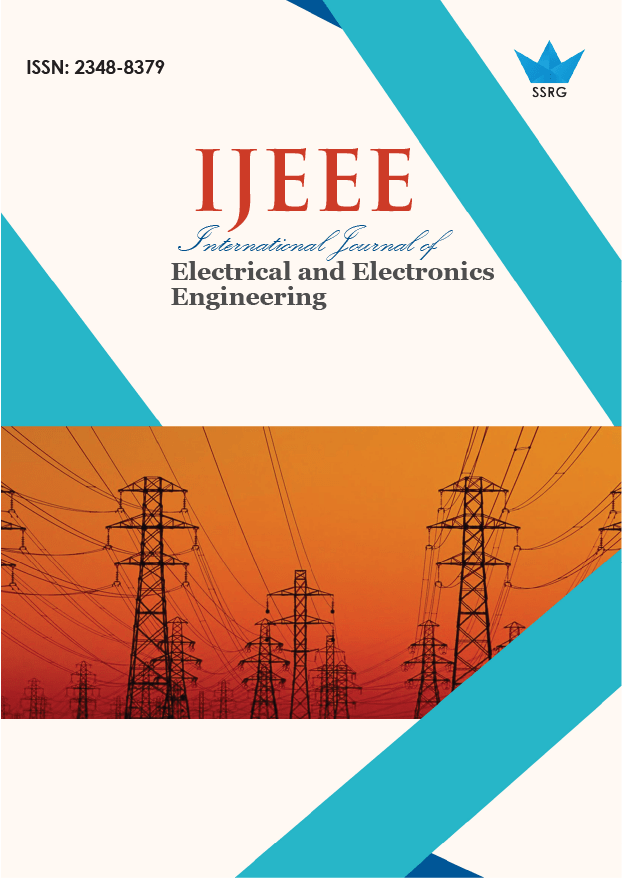A Novel Home Energy Management Algorithm Based on User Demand Analysis in Vietnam: A Case Study

| International Journal of Electrical and Electronics Engineering |
| © 2024 by SSRG - IJEEE Journal |
| Volume 11 Issue 2 |
| Year of Publication : 2024 |
| Authors : T.B.T. Truong, H.V.P. Nguyen, V.T. Nguyen |
How to Cite?
T.B.T. Truong, H.V.P. Nguyen, V.T. Nguyen, "A Novel Home Energy Management Algorithm Based on User Demand Analysis in Vietnam: A Case Study," SSRG International Journal of Electrical and Electronics Engineering, vol. 11, no. 2, pp. 65-73, 2024. Crossref, https://doi.org/10.14445/23488379/IJEEE-V11I2P108
Abstract:
Smart Grid is one of the most critical challenges in Vietnam. An effective management system of residence power consumption is an integral part of the smart grid, and significantly reducing power consumption in peak hours is a great challenge. However, the solutions of Electricity of Vietnam Corporation do not compose an analysis of user demand in order to make it more effective. This article proposes a novel algorithm for effective management of home energy, taking into account the user demand analysis. This paper refers to two issues: firstly, a study of user demand for home devices is given. Then, a novel algorithm is proposed to optimize the operation schedules of home appliances based on two criteria: economic electricity bill and reduced power consumption under a pre-defined threshold.
Keywords:
Smart home, Smart meter, User demand, Home energy management, Power consumption.
References:
[1] Luis Pérez-Lombard, José Ortiz, and Christine Pout, “A Review on Buildings Energy Consumption Information,” Energy and Buildings, vol. 40, no. 3, pp. 394-398, 2008.
[CrossRef] [Google Scholar] [Publisher Link]
[2] Xiaodong Cao, Xilei Dai, and Junjie Liu, “Building Energy-Consumption Status Worldwide and the State-of-the-Art Technologies for Zero-Energy Buildings during the Past Decade,” Energy and Buildings, vol. 128, pp. 198-213, 2016.
[CrossRef] [Google Scholar] [Publisher Link]
[3] Manisa Pipattanasomporn, Murat Kuzlu, and Saifur Rahman, “An Algorithm for Intelligent Home Energy Management and Demand Response Analysis,” IEEE Transactions on Smart Grid, vol. 3, no. 4, pp. 2166-2173, 2012.
[CrossRef] [Google Scholar] [Publisher Link]
[4] Jinsoo Han et al., “Green Home Energy Management System through Comparison of Energy Usage between the Same Kinds of Home Appliances,” 2011 IEEE 15th International Symposium on Consumer Electronics (ISCE), Singapore, pp. 1-4, 2011.
[CrossRef] [Google Scholar] [Publisher Link]
[5] Altaf Q.H. Badar, and Amjad Anvari-Moghaddam, “Smart Home Energy Management System–A Review,” Advances in Building Energy Research, vol. 16, no. 1, pp. 118-143, 2022.
[CrossRef] [Google Scholar] [Publisher Link]
[6] Xin Jin et al., “Foresee: A User-Centric Home Energy Management System for Energy Efficiency and Demand Response,” Applied Energy, vol. 205, pp. 1583-1595, 2017.
[CrossRef] [Google Scholar] [Publisher Link]
[7] Bandana Mahapatra, and Anand Nayyar, “Home Energy Management System (HEMS): Concept, Architecture, Infrastructure, Challenges and Energy Management Schemes,” Energy Systems, vol. 13, pp. 643-669, 2022.
[CrossRef] [Google Scholar] [Publisher Link]
[8] Michael Angelo A. Pedrasa, Ted D. Spooner, and Iain F. MacGill, “Coordinated Scheduling of Residential Distributed Energy Resources to Optimize Smart Home Energy Services,” IEEE Transaction on Smart Grid, vol. 1, no. 2, pp. 134-143, 2010.
[CrossRef] [Google Scholar] [Publisher Link]
[9] Amir-Hamed Mohsenian-Rad et al., “Optimal and Autonomous Incentive-Based Energy Consumption Scheduling Algorithm for Smart Grid,” 2010 Innovative Smart Grid Technologies (ISGT), Gaithersburg, USA, pp. 1-6, 2010.
[CrossRef] [Google Scholar] [Publisher Link]
[10] Sami Ben Slama, “Design and Implementation of Home Energy Management System Using Vehicle to Home (H2V) Approach,” Journal of Cleaner Production, vol. 312, 2021.
[CrossRef] [Google Scholar] [Publisher Link]
[11] A. Rifat Boynuegri et al., “Energy Management Algorithm for Smart Home with Renewable Energy Sources,” 4th International Conference on Power Engineering, Energy and Electrical Drives, Istanbul, Turkey, pp. 1753-1758, 2013.
[CrossRef] [Google Scholar] [Publisher Link]
[12] Qing Lu, Zhixin Zhang, and Shuaikang Lü, “Home Energy Management in Smart Households: Optimal Appliance Scheduling Model with Photovoltaic Energy Storage System,” Energy Reports, vol. 6, pp. 2450-2462, 2020.
[CrossRef] [Google Scholar] [Publisher Link]
[13] Yantai Huang, Hongjun Tian, and Lei Wang, “Demand Response for Home Energy Management System,” International Journal of Electrical Power and Energy Systems, vol. 73, pp. 448-455, 2015.
[CrossRef] [Google Scholar] [Publisher Link]
[14] Federal Energy Regulatory Commission, Assessment of Demand Response and Advanced Metering, 2011. [Online]. Available: https://www.ferc.gov/power-sales-and-markets/demand-response/reports-demand-response-and-advanced-metering
[15] Shengnan Shao et al., “Impact of TOU Rates on Distribution Load Shapes in a Smart Grid with PHEV Penetration,” IEEE PES T&D 2010, New Orleans, USA, pp. 1-6, 2010.
[CrossRef] [Google Scholar] [Publisher Link]
[16] Zhuang Zhao et al., “An Optimal Power Scheduling Method for Demand Response in Home Energy Management System,” IEEE Transactions on Smart Grid, vol. 4, no. 3, pp. 1391-1400, 2013.
[CrossRef] [Google Scholar] [Publisher Link]
[17] Mohammad Sadegh Javadi et al., “Self-Scheduling Model for Home Energy Management Systems Considering the End-Users Discomfort Index Within Price-Based Demand Response Programs,” Sustainable Cities and Society, vol. 68, 2021.
[CrossRef] [Google Scholar] [Publisher Link]
[18] Mary Ann Piette et al., “Automated Demand Response Strategies and Commissioning Commercial Building Controls,” Lawrence Berkeley National Laboratory, pp. 1-13, 2006.
[Google Scholar] [Publisher Link]
[19] A.M. Vega, F. Santamaria, and E. Rivas, “Modeling for Home Electric Energy Management: A Review,” Renewable and Sustainable Energy Reviews, vol. 52, pp. 948-959, 2015.
[CrossRef] [Google Scholar] [Publisher Link]
[20] Joaquim Leitão et al., “A Survey on Home Energy Management,” IEEE Access, vol. 8, pp. 5699-5722, 2020.
[CrossRef] [Google Scholar] [Publisher Link]
[21] Renzhi Lu, Seung Ho Hong, and Mengmeng Yu, “Demand Response for Home Energy Management Using Reinforcement Learning and Artificial Neural Network,” IEEE Transactions on Smart Grid, vol. 10, no. 6, pp. 6629-6639, 2019.
[CrossRef] [Google Scholar] [Publisher Link]
[22] S. Rajalingam, and R. Mahamari, “Dynamic Load Management for Smart Home Using Home Energy Management Algorithm,” International Journal of Engineering Science Invention Research & Development, vol. 2, no. 8, pp. 571-581, 2016.
[Publisher Link]

 10.14445/23488379/IJEEE-V11I2P108
10.14445/23488379/IJEEE-V11I2P108